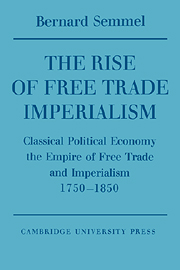 The Rise of Free Trade Imperialism
The Rise of Free Trade Imperialism Book contents
- Frontmatter
- Contents
- Preface
- 1 Introduction
- 2 Theory and politics of Free Trade Empire in the eighteenth century
- 3 The agrarian critique and the emergence of orthodoxy
- 4 The third school: Wakefield and the Radical economists
- 5 The Wakefield program for middle-class empire
- 6 Parliament, political economy, and the Workshop of the World
- 7 Cobdenism and the ‘dismal science’
- 8 Mercantilist revival
- 9 Classical political economy, the Empire of Free Trade, and imperialism
- Selected Bibliography
- Index
7 - Cobdenism and the ‘dismal science’
Published online by Cambridge University Press: 23 October 2009
- Frontmatter
- Contents
- Preface
- 1 Introduction
- 2 Theory and politics of Free Trade Empire in the eighteenth century
- 3 The agrarian critique and the emergence of orthodoxy
- 4 The third school: Wakefield and the Radical economists
- 5 The Wakefield program for middle-class empire
- 6 Parliament, political economy, and the Workshop of the World
- 7 Cobdenism and the ‘dismal science’
- 8 Mercantilist revival
- 9 Classical political economy, the Empire of Free Trade, and imperialism
- Selected Bibliography
- Index
Summary
It was probably, as we have seen, the specifically anti-colonial sentiments and phrases of the party of Hume and Cobden, which, in the cosmopolitan heyday of free trade, many Britons were to share and to mouth, which have for so long made historians view an age of colonization as one merely of the dismantling of colonial empire; it was the liberal and even democratic vocabulary of ‘responsible self-government’ of the Radical Colonial Reformers which permitted later generations to sympathize with their attack on ‘Mr Mother-Country’ Stephen, while either ignoring or viewing with a secularist suspicion the pleas of the ‘missionary interest’. Similarly, it was Cobden's benign view of a cosmopolitan and pacific international division of labor, erected upon the most liberal principles of political economy, which led historians for so long, to ignore the voluminous evidence that another, less cosmopolitan vision of empire, one derived from England's mercantilist past, was prevalent, probably predominant, not only in the parliament as a whole, but also among parliamentary Radicals; it was probably this as well which led historians to pass over the very unpacific jingoism of the leading Radicals, both anti-colonial and colonizers, when matters concerning the expansion of trade were at issue. Finally, it was the victory of an optimistic Cobdenism (the temper of which was reinforced by the prosperity of the fifties and sixties), with its vision of the smooth passage of industrialism, based on an almost religious conviction of the spiritual and moral truth of free trade, as we shall see, which has made us forget the existence of a full-scale theory of capitalist imperialism, which, following the pessimistic principles of the heterodox agrarian economists and of Wakefield, saw the necessity of a continually expanding foreign trade and of colonization to a developing industrialism.
- Type
- Chapter
- Information
- The Rise of Free Trade ImperialismClassical Political Economy the Empire of Free Trade and Imperialism 1750–1850, pp. 158 - 175Publisher: Cambridge University PressPrint publication year: 1970
- 2
- Cited by
